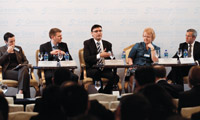Main Story
Time for governments to step up
March 1st 2013
When 160 delegates from the Asia-Pacific, North and South America and Europe met in Hong Kong for Orient Aviation’s 5th Greener Skies aviation and environment conference last month the spotlight shone on efforts to pin down a global emissions trading scheme for the industry. Read More » But there are other critical elements required to reduce aviation’s carbon footprint.
 |
| Ken McLean, Asia regional director safety, operations and infrastructure for IATA makes his point during the ATM strategies to reduce emissions panel |
If aviation - airlines, airports, air navigation service providers and manufacturers – is to meet its commitment to improving fuel efficiency by 1.5% annually to 2020, achieve carbon neutral growth from 2020, and cut its net emissions in half by 2050 compared to 2005 levels, it will need a lot more than an ETS scheme to achieve it. Not least, more assistance from governments.
The good news, according to International Air Transport Association (IATA) director general and CEO, Tony Tyler, is that progress is being made in the industry’s four pillar strategy: investment in new technologies, more efficient operations, better infrastructure and positive economic measures, now more commonly known as market based measures or MBMs.
It was the biggest Greener Skies conference to date and Tyler, in his keynote address, made it clear there could be no letting up on any of the industry’s efforts across the spectrum of environmental measures.
“Our license to grow is contingent on our ability to do so sustainably. That means managing our emissions and other environmental impacts effectively,” he said, adding the Asia-Pacific, in particular, has a huge stake in aviation’s ability to expand.
“In 2016, we expect 3.6 billion people to board airplanes. That’s 600 million more than this year. And about half of that growth will be on flights to, from or within Asia. That increase in connectivity will drive economies, generate jobs and create wealth. So it is critically important to protect aviation’s license to grow and ensure that it meets its sustainability commitments.”
 |
| Members of the panel who discussed airline strategies to reduce emissions. From left: head of environment affairs, Etihad Airways, Linden Coppell; manager of environment policy, British Airways, Andy Kershaw; head of group environment and sustainability, Qantas Airways, John Valastro; managing director safety, health & environment, Delta Air Lines, Helen Howes; head of environment affairs, Cathay Pacific Airways, Mark Watson |
Tyler stressed it was not just about MBMs. For a start, sustainable biofuels offered a tremendous opportunity for aviation. “They have been tested and certified. And over 1,500 commercial flights have been powered with the help of low-carbon alternative fuels since certification was granted in 2011,” he said.
So the question arises: why are they not playing a greater role in the aviation industry? The answer is simple. The small quantities being produced have not achieved the economies of scale necessary to bring the price down to economic levels. And, with a few exceptions, government policies are not providing proactive support.
There was universal agreement at the conference that governments could sponsor more research to improve production methods and expand source crops, prioritize developing policies that de-risk investment in biofuels and related industries and support supply chain collaboration for biofuels’ access to airport distribution points.
The conference also heard about efforts towards “seamless” Asian skies in terms of air traffic management.
“We are eager to fly more efficiently,” said Tyler. “And that would help the environment. Airlines have invested billions in advanced avionics. And much of this goes to waste because improvements in air traffic management have not kept pace. Technology is the answer. But in many cases politics is a blocker.”
During the conference, expert panels discussed a variety of issues, from asking if politics is obstructing environmental progress in the aviation industry (yes, was the short answer) to ATM strategies, biofuel development and the efforts of manufacturers to bring more efficiencies to their products.
Both Airbus and Boeing briefed delegates on the work they were doing to find technological solutions that will make tomorrow’s aircraft even more efficient than they are today.